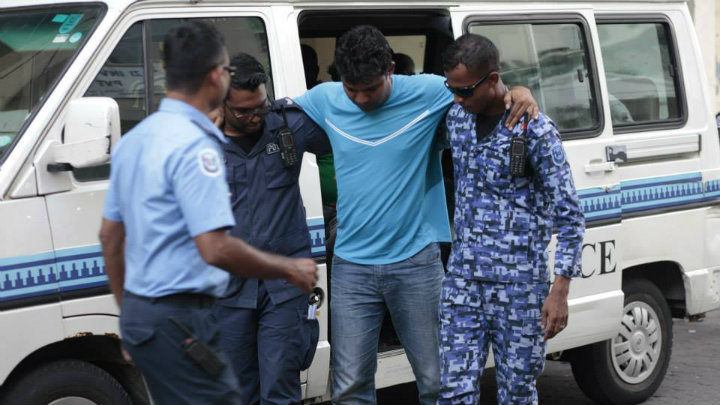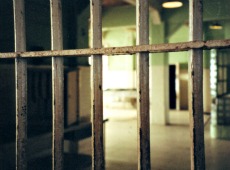The human rights watchdog has launched an investigation into police brutality against protesters arrested from an anti-government rally on Friday amidst growing concern over custodial abuse.
The Human Rights Commission of the Maldives (HRCM) said its officials were denied access to detainees at the police headquarters on Friday night, but were able to visit the detainees the following morning at Dhoonidhoo.
The commission is now investigating three cases of apparent brutality, member Jeehan Mahmoud said.
Meanwhile, eyewitnesses have told Minivan News they saw policemen in plainclothes beating a man around 3:15am on Saturday near the Henveiru stadium. Seven men, some wearing jerseys and shorts, repeatedly punched and kicked the man and drove off with him in a police van.
Other sources say a 35-year-old man was arrested without a court warrant from his residence near the Henveiru stadium, on suspicion of beating a police officer at the protest. The source alleged the man was also beaten at the police headquarters, released the next day, and arrested again with a court warrant.
Jeehan said the HRCM is looking into the case as well.
Nearly 200 protesters were arrested from the opposition’s May Day rally after clashes with riot police. The numbers arrested are the highest from a single protest in a decade. Some 175 protesters are being held in remand detention for 15 days at the police custodial island of Dhoonidhoo near Malé.
Lawyers for the detainees and the main opposition Maldivian Democratic Party (MDP) have accused police of brutalising the protesters during and after arrest and holding them in inhumane conditions at the packed detention centre.
The MDP alleged in a statement today that Specialist Operations (SO) police officers kicked former MP Ahmed Easa on his spine and shoulders and hit him on the head with batons after hauling him onto a police vehicle.
Minivan News journalists at the scene heard Easa scream in apparent pain from inside the vehicle, which was packed with SO officers. Easa was limping when he appeared in court on Saturday.
The MDP said police officers threatened to torture Easa while he was waiting at the criminal court and have so far refused to bring the former MP to Malé for treatment. Lawyers said Easa and other detainees have been provided treatment by police doctors at Dhoonidhoo.
Easa and other detainees were kept 25 people to a cell, which were infested with mosquitos, the opposition party said. Police routinely whacked the bars of the cell to prevent Easa from sleeping, the MDP statement added.
Other detainees, including two pregnant women, have complained of being kept in overcrowded cells with no ventilation.
Lawyers said former MDP MP Ibrahim Rasheed ‘Bonda’ had a swollen eye while other detainees had sustained a range of injuries during their arrest.
A man and woman arrested from a protest pickup that had charged through police lines into the green zone at dusk on Friday were also severely beaten, lawyers said.
A police media official told Minivan News that all the detainees, including Easa, were arrested in full view of the media, who were free to observe and report police conduct.
Lawyers for the detainees have not lodged complaints of brutality with the police, the official noted, adding that cases could also filed with independent oversight bodies such as the Police Integrity Commission (PIC) and HRCM.
The head of the PIC was unavailable for comment at the time of publication.
Police said six people have been arrested so far in connection with assaulting the police officer on Friday night. Two men aged 35 and 49 were arrested on Saturday while a 30-year-old woman and three men aged 19, 48, and 28 were arrested on Sunday.
The criminal court has extended the remand detention of all six suspects to 15 days.
Lawyers told Minivan News that they have not had access to detainees held on suspicion of assaulting the police officer.
A seventh suspect has reportedly been arrested this evening. Local media said 19-year-old Mohamed Laban, the goalkeeper of football club Eagles, was arrested around 5:45pm upon his arrival for training at the Maafanu stadium.
Laban is accused of tripping an SO officer. Police have posted videos of the incident, which show protesters kick and severely beat him on the ground with his baton.
Eyewitnesses at the scene told Minivan News at the time that other protesters, including Easa, shoved off the violent protesters, helped the fallen officer to his feet, and took him back behind police lines.
In a report released yesterday after observing the May Day protest, human rights NGO Maldivian Democracy Network (MDN) said protesters sustained injuries after police used their shields to push people back.
“The police were also heard using inappropriate and abusive language at the crowds, displaying acute hostility towards the people gathered. It was also observed that some individuals used hateful language and threw plastic bottles and stones at the police,” MDN said.
“Protesters who were arrested after police charged into the crowds were seen to have been pushed, forced to run with several policemen or carried by more than three or four policemen,” the observation briefing stated.
“It was noted that requests by these protesters to let them walk calmly was not respected by the police, and rough handling which led to individuals beings banged into the barricades, injuries and also for several individuals to lose their footwear or cause damage to clothes was observed.”
The MDN also noted that it was unclear whether the individuals arrested during periodic charges by SO officers were responsible for breaching barricades or were simply bystanders.
The MDN praised police personnel who assisted injured protesters and helped wash pepper spray from their eyes and attended to cuts and bruises.
Transparency Maldives has meanwhile condemned police for charging at “peaceful protesters” as well as the “mob attacks on police officers by protestors at the May Day protest.”

